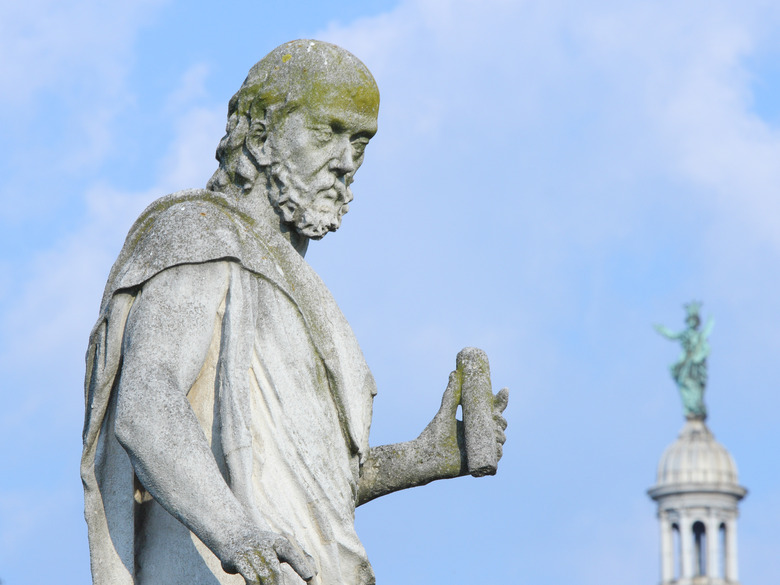Galileo Galilei's Invention & Contributions
Few individuals have had as profound an impact on science as Italian physicist and astronomer Galileo Galilei, whose groundbreaking inventions and discoveries earned him the title "father of modern science.” With contributions in math, physics, and astronomy, Galileo's innovative, experiment-driven approach to science made him a key figure of the Scientific Revolution of the 16th and 17th centuries. During this time, he all but disproved the Aristotelian physics and cosmology that had previously dominated the sciences in Europe.
TL;DR (Too Long; Didn't Read)
Italian scientist Galileo Galilei made major contributions to math, physics and astronomy during the Scientific Revolution of the 16th and 17th Century. The so-called "father of modern science," his work on proving the heliocentric model of the galaxy brought him into conflict with the Catholic church.
Experiments in Motion
Experiments in Motion
The law of falling bodies is one of Galileo's key contributions to physics. It states that objects fall at the same speed regardless of weight or shape. Through his experiments, Galileo countered the pervasive Aristotelian view, which held that heavier objects fall faster than lighter objects. The distance an object travels, he calculated, is proportional to the square of the time it takes the object to reach the ground. Galileo also first developed the concept of inertia — the idea that an object remains in rest or in motion until acted on by another force — which became the basis for one of Isaac Newton's laws of motion.
Geometric and Military Compass
Geometric and Military Compass
In 1598, Galileo began selling a geometric and military compass of his own design, though the profits were minimal. Consisting of two rulers attached at right angles with a third, curved ruler between them, Galileo's compass — known as a sector — had multiple functions. Soldiers in the military used it to measure the elevation of a cannon's barrel, while merchants employed it to calculate currency exchange rates.
An Improved Telescope
An Improved Telescope
While he did not invent the telescope, the enhancements Galileo made to original Dutch versions of the instrument enabled him to make new empirical discoveries. While early telescopes magnified objects by three times, Galileo learned to grind lenses — an advancement that eventually created a telescope with a magnifying factor of 30x. With his unprecedentedly powerful telescopes, Galileo was the first to observe the uneven, cratered surface of the moon; Jupiter's four largest satellites, dubbed the Galilean moons; dark spots on the surface of the sun, known as sunspots; and the phases of Venus. The telescope also revealed that the universe contained many more stars not visible to the naked eye.
The Case for Heliocentrism
The Case for Heliocentrism
In the 16th century, Polish astronomer Nicolaus Copernicus became the first scientist to promote a model of the solar system in which the Earth orbited its sun rather than the other way around. Galileo's observations discredited the Aristotelian theory of an Earth-centered solar system in favor of the Copernican heliocentric model. The presence of moons in orbit around Jupiter suggested that the Earth was not the sole center of motion in the cosmos, as Aristotle had proposed. Furthermore, the realization that the surface of the moon is rough disproved the Aristotelian view of a perfect, immutable celestial realm. Galileo's discoveries — including the theory of solar rotation, as suggested by shifts in sunspots — incurred the wrath of the Catholic Church, which espoused the Aristotelian system. Upon finding him guilty of heresy in 1633, the Roman Inquisition forced Galileo to rescind his support of heliocentrism and sentenced him to house imprisonment — he would eventually die, still under arrest, in 1642.
References
- Encyclopedia Britannica: Galileo
- History.com: Galileo Galilei – Facts and Summary
- The Galileo Project: Science – On Motion
- Smithsonian Magazine: Science – Galileo's Instruments
- The Galileo Project: Science – Copernican System
- SparkNotes: The Scientific Revolution (1550-1700) – The Re-Formation of the Heavens
- The Physics Classroom: Inertia and Mass
- The Galileo Project: Science – Sector
- Space.com: Galileo Galilei: Biography, Inventions and Other Facts
- Smithsonian Magazine: Galileo's Revolutionary Vision Helped Usher In Modern Astronomy
Cite This Article
MLA
Alonso, Nathalie. "Galileo Galilei's Invention & Contributions" sciencing.com, https://www.sciencing.com/galileo-galileis-invention-contributions-23437/. 23 April 2018.
APA
Alonso, Nathalie. (2018, April 23). Galileo Galilei's Invention & Contributions. sciencing.com. Retrieved from https://www.sciencing.com/galileo-galileis-invention-contributions-23437/
Chicago
Alonso, Nathalie. Galileo Galilei's Invention & Contributions last modified August 30, 2022. https://www.sciencing.com/galileo-galileis-invention-contributions-23437/
